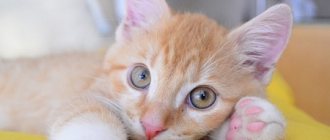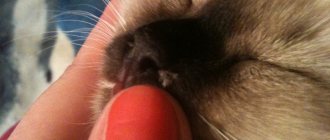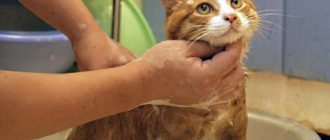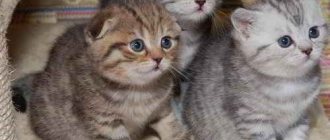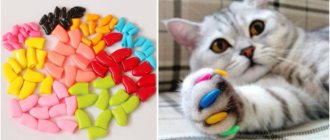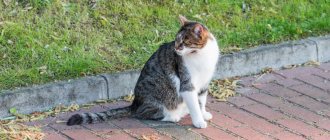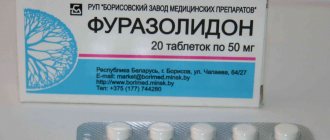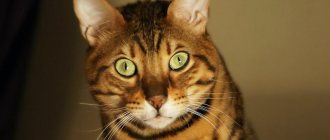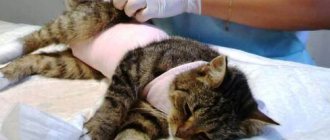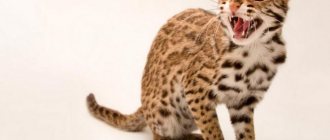What danger do fleas pose?
Why, if a pregnant cat is infected with ectoparasites, is the issue of combating them so acute? Firstly, fleas cause a lot of problems for your pet: it constantly itches, gets nervous, scratches and other lesions appear on the skin. Secondly, if a mother cat has fleas, they will definitely spread to the kittens. And for children they pose a much greater danger than for adults. Kittens with very delicate skin will experience severe itching and irritation. They will develop poorly, grow weak, anemic and restless. Fleas are also carriers of worms and diseases. To avoid all these troubles, you must initially protect your cat from infection by harmful insects. For example, for preventive purposes, put a flea collar on her.
But there are times when a pet becomes infected with fleas and is a complete surprise to its owners. And then pregnant cats can buy flea drops at a veterinary pharmacy. Even a small drop can cause ectoparasites to actively fall from the animal. Many cat owners prefer these drugs. But not any drops are suitable for pregnant cats, but only those that have a gentle effect. After all, the insecticides contained in the drugs negatively affect the course of pregnancy, causing miscarriages and disturbances in fetal development.
To avoid mistakes when choosing drops, you must consult a veterinarian and use the recommended anti-flea product in strict accordance with the instructions for its use.
Rules for handling a pregnant cat
If parasites are found in your pet's fur, you should consult a veterinarian. The specialist will select the safest flea treatments and dosages, which are important to follow exactly. The animal's bedding must be boiled or replaced with new one. Before using a product that kills insects, you must first comb your pet. You will have to vacuum all the rooms where the animal is and disinfect them. The container must then be cleaned. It is important to follow the instructions included with the medication when external parasites appear.
There is no need to ignore the pathology: it can harm both the pregnant pet and the newborn babies. The risk of infection with worms, the development of allergic dermatitis, and hair loss increases. Kittens may be born too small, anemic, and underweight. The question of how to remove fleas from a pregnant cat should be asked as soon as possible after symptoms are detected: frequent scratching, restlessness, attempts to bite into the skin.
Imported drugs
When treating pregnant cats with flea drops, it is necessary to completely exclude the possibility of a toxic substance getting inside (for example, by licking or penetrating through the skin into the blood). Therefore, they must either be of natural origin or contain low-hazard components and be approved for pregnant cats. There are few such drugs, but they exist. Here is a list of foreign drops on the withers recommended for use for pregnant cats:
- Frontline Spot It is from the French manufacturer Merial. The active ingredient is fipronil, which has good safety characteristics for animals. It acts selectively on the nerve endings of parasites, causing their death. After applying the drops, the cat should not be bathed for 2 days. The flea protection period is 2 months. Laboratory tests have shown the absolute safety of this insectoacaricidal drug for pregnant and lactating cats. No side effects were identified. By the way, the drug is used to combat not only fleas, but also mites, including scabies and ear mites, lice, and lice.
- Advantage from the famous German company Bayer Health Care. The active substance is imidacloprid, which has nerve paralytic properties. Once on the withers, the drug is then distributed throughout the skin without being absorbed into the pet’s blood. After 12 hours you can see the result. Another advantage of the drug is its moisture resistance, so the animal can walk freely, regardless of rain or snow. The drops will protect your mustachioed pet from fleas, lice and lice for a month, affecting both adults and eggs and larvae. Possible side effects include itching and redness of the skin.
- Stronghold (manufacturer: Pfizer Animal Health, USA). A systemic drug based on selamectin. Absorbed into the blood, it does not penetrate the blood-brain barrier of mammals, but paralyzes fleas, ticks, helminths (nematodes), causing their subsequent death. In this case, there is no release of toxic substances released by dying parasites. Therefore, Stronghold drops can be used for weak, old and young (6 weeks and older) animals. The duration of the drug is one month. Important: Do not apply to wet skin.
How can you tell if your pet has contracted fleas?
These parasites are blood-sucking insects; they feed on the blood of warm-blooded animals and humans (see photo). In search of food, bloodsuckers settle not only on cats, but also on other animals with thick fur: dogs, rats, mice, rabbits, etc. These arthropods are adapted to prolonged fasting.
If possible, you should contact a veterinarian who will tell you what to do and which method of treatment is suitable in a particular case. There are several ways to combat these blood-sucking insects. To get rid of fleas, you can use ready-made and folk remedies. The first include drops, sprays and aerosols, tablets and injections, zoo shampoos, flea collars.
To quickly remove fleas, you can treat your pet with drops. When using antiparasitic drugs in this form, a number of rules must be observed:
- Apply the solution to dry skin without damage.
- Drop the medicine onto areas of the body that are inaccessible for licking, for example on the withers.
- After treatment with drops, do not bathe or touch your pet for a certain time (depending on the manufacturer). It is also recommended to exclude his contact with small children.
| Name of drops | Active substance | Auxiliary components | Contraindications | Minimum age at which drops are allowed to be used, weeks | |
| Are common | Private | ||||
| Stronghold | Selamectin | Dipropylene glycol, isopropyl alcohol | Individual intolerance to the components of the drug | Not found. | 6 |
| Advocate | Imidacloprid, moxidectin | Benzyl alcohol, propylene carbonate, butylated hydroxytoluene | Infections, rehabilitation period. | 7 | |
| Amitan | Amitraz | Emulsifier neonol AF 9-10/OP-7 (OP-10), ethyl alcohol, ortho-xylene | Rehabilitation period, illness, pregnancy. | 8 | |
| Frontline | Fipronil | Polyvidone, polysorbate, butylated hydroxyanisole, butylhydrotoluene, diethylene glycol monoethyl ether | Infectious diseases, weakening of the body, rehabilitation period, weight less than 1 kg. | ||
| Leopard | Fipronil, diflubenzuron | Citronella essential oil, isopropyl alcohol, polyvinylpyrrolidone, Tween-80, polyethylene glycol 400 | Infections, weakening of the body, recovery from illness, pregnancy, lactation. |
A pet can be cured of these ectoparasites using a special shampoo. It is enough to apply it liberally to the cat's fur, leave for a few minutes to achieve the desired result and rinse with plenty of running water. Washing the cat once is usually enough to remove ectoparasites.
The dose of zoo shampoo depends on the animal’s body weight and coat length. When using the product, care must be taken not to get it into his eyes. You also need to prevent your cat from licking the shampoo.
The most effective insecticidal preparations in this release form include:
- "Dana", in the production of which permethrin is used as an active ingredient. The product is contraindicated for animals suffering from infectious diseases and recent illness, nursing pets, and kittens under 3 months of age.
- "Celandine". Weakened, exhausted cats, those suffering from infectious diseases, and convalescent cats should not be treated with shampoo, which is also based on the use of permethrin.
- “Leopard”, made from lavender and costus oil, clove and geranium extract.
- "Phytoelite", based on the use of permethrin. Contraindications to the use of zoo shampoo: infections, rehabilitation and lactation periods, age up to 8 weeks.
- "Demos-Lux". Animals suffering from infectious diseases and recovering, nursing pets, and kittens under 3 months of age should not be treated with a product that contains permethrin.
Drops from Russian manufacturers
From the entire arsenal of anti-flea drops produced by domestic manufacturers, we can recommend Inspector (from the Ecoprom company) and Biovax for pregnant cats.
The inspector contains two active ingredients - fipronil (10%) and moxidetin (1%). Fipronil is quickly distributed over the surface of the body, having a paralytic effect on ectoparasites, and is practically not absorbed through the skin. Moxidetin, on the contrary, penetrates the blood and is distributed in internal tissues and organs, destroying nematodes and external pests. After treatment, the animal cannot be bathed or washed for 5 days. The anti-flea effect lasts for one and a half months.
Biovax contains exclusively natural components that do not have a toxic effect on the animal’s body in general and pregnancy in particular. The drug has an insecticidal and repellent effect, but less pronounced than its synthetic analogues. Destroys fleas and ticks and repels horseflies, flies, and mosquitoes. After application, the death of ectoparasites occurs within 24 hours, and the animal continues to be protected for a month. The advantages of Biovax drops include their antifungal and antiseptic effect, a positive effect on the condition of the fur, and the elimination of itching and skin irritation. Before applying the drug, it is recommended to conduct a test to determine its tolerance to animals. It is enough to apply 3-4 drops to the withers and observe the cat’s reaction for half an hour. If there are no side effects, use the rest of the product.
Veterinarian advice
- Most often, the appearance of fleas on a pet is the result of a violation of basic hygiene rules.
- The flea population is enormous in size and no more than 5% of the total number parasitizes the animal’s body.
- Fleas can infest not only sleeping areas and pet carriers, but also actively breed behind baseboards and in other cracks and seams.
- According to experts, daily use of a vacuum cleaner can reduce the ectoparasite population by almost 50%.
By being patient and armed with our advice, you can alleviate the difficult situation of your pregnant cat and protect her offspring from encountering parasites.
Owner stories
Galina: “The badger picked up fleas at the dacha. We noticed only when he began to itch all day long. The veterinary pharmacy recommended Frontline spray to us. They only warned us to buy a protective collar so that after treatment the cat would not ingest toxic medicine. The spray turned out to be very effective indeed. We treated the cat only once, he stopped itching. To be on the safe side, we did a secondary treatment after 14 days.”
Svetlana: “We picked up a kitten on the street. He was dirty and skinny. They brought it home, washed it, dried it, and found fleas on it. The veterinarian said that such a baby cannot be treated with drops. We washed him at home several times with Lugovoi shampoo, and at the clinic we treated him with flea powder.”
Useful videos
Traditional methods
- You can make your own anti-flea shampoo. To do this you will need baby soap and yarrow herb. Approximately 50 g of soap is grated, poured with 2 cups of boiling water and placed in a water bath. The mixture should simmer on it for about 30 minutes until the soap dissolves. Then add 35 ml of yarrow solution, which can be bought at the pharmacy, to the cooled mixture. The mixture is infused under the lid for about 2 hours. Lather the entire animal with the prepared solution, leave for about 15 minutes and rinse off with plenty of warm water. The procedure is carried out carefully so that the product does not get into the animal’s eyes or ears.
- Plants such as wormwood and tansy are also suitable for repelling fleas on nursing cats and kittens. 35 g of grass are poured into a container and 0.7 liters of boiling water is poured into it. Leave the mixture covered for approximately 4 hours. Then it is filtered and another 0.3 liters of water are added to the solution. The liquid is heated and the animal’s fur is moistened with it, avoiding the eye area. After 15 minutes, the cat is bathed with shampoo and washed with clean water.
You can prepare a decoction of 25 g of wormwood and 0.5 liters of water. The animal's fur is moistened with the prepared cooled solution.
In this case, the fleas will quickly scatter; they must be caught and thrown into a prepared container of water. As long as the smell of wormwood lingers on the cat, fleas will not stick to it. Children can also be treated in the same way. The bedding on which the animal is located is also treated with a decoction of wormwood. You can place bunches of fresh wormwood and tansy around the room; the plants will repel insects.
The easiest and safest way to rid nursing cats of fleas is to comb them out. To do this, you will need a special comb with fine teeth. The procedure must be carried out carefully so as not to damage the animal’s skin. The comb is guided along the hair growth, gradually moving. If you find an insect, quickly crush it with your nails and throw it into a bowl of water. Particular attention must be paid to the abdominal area, under the arms and near the groin. In this way you can remove insects from small kittens.
The owner needs to carefully monitor his pet, preferably to prevent fleas from appearing on a nursing cat. The bites of these parasites are very harmful to small kittens, causing their skin to become red and severely itchy. It is recommended to treat the animal before the kittens are born. A veterinarian, whom you should consult for advice, will help you choose the right product.
Are fleas dangerous for humans?
However, some people are bitten by fleas, while others can sleep comfortably with a flea-covered pet in the same bed, but not feel any discomfort.
It should be remembered that:
- fleas are carriers of various infections;
- fleas can cause allergies and skin diseases;
- cause helminthic infestations that are transmitted to humans.
Therefore, regular antiparasitic treatment of pets is mandatory, even if the animal stays at home and never goes outside.
What to pay attention to
Antiparasitic drops should be designed specifically for cats. Dog medications often contain other ingredients that can harm meowing pets.
Before use, you should carefully study the instructions for the drug and strictly follow its recommendations and dosages.
As a rule, you need to drip the drug onto the skin in the area of the withers or between the shoulder blades; these places are inaccessible to the cat for licking. In these areas, you need to part the animal’s fur and apply the substance directly to the skin. It must be dry and undamaged. The drops should not be rubbed in.
Do not use the drug if the cat is weakened or sick. For pregnant cats, the simultaneous use of several anti-flea products is also prohibited.
Preferred means
During pregnancy, flea treatment should exclude the possibility of ingestion of even a tiny amount of the drug. It is for this reason that it is preferable to use the following low-toxic agents:
The most suitable collar is “Clandestine”; this product does not affect the intrauterine development of kittens, but when they are born, it must be removed, since babies may begin to play with it or confuse it with the nipple, which can have a bad effect on them.
- Anti-flea shampoos with herbal ingredients
Can only be used if the cat is not afraid of water and will not actively resist, so that it does not become very stressed. Shampoos are lethal to parasites and safe for pets. The most important thing is to strictly follow the instructions and thoroughly rinse off the product, then, for greater efficiency, comb the fur with a thick comb to remove any remaining fleas.
A good option would be Lugovoi shampoo, which is mild in action and contains herbal extracts.
- Special drops for fleas
Some of their types are capable of penetrating into the cat’s blood, so their use must be coordinated with a doctor, who will tell you exactly whether it is possible to poison fleas with drops in each specific case.
Get rid of fleas on a kitten using home remedies
If you are afraid of medications containing insecticides, you can get rid of cat parasites using folk remedies. Natural ingredients will not harm the animal, but regularity will be a prerequisite to achieve the desired effect. Here's what works best in the fight against parasites:
- Herbs (dry, fresh, in the form of infusions and decoctions). For some reason, fleas cannot tolerate eucalyptus, tansy and wormwood, and cat owners actively take advantage of this. Place fresh herbs in corners, inside cabinets and under rugs. Decoctions can be sprayed on upholstered furniture, cat hair and floor coverings.
- Apple vinegar. The product must be natural. After dissolving the vinegar in water, apply it to your pet's fur. Treat carpets and baseboards at the same time.
- Sawdust and pine needles. You will not be able to kill insects with these products. Scatter needles and sawdust around the apartment - this will repel parasites. Use this solution in combination with other medications.
- Vanilla. If you take a little vodka and vanilla sticks, you can prepare a wonderful infusion against arthropods. The liquid must be applied to the animal's fur. The effect is quite strong.
- Soda fumes. This product destroys flea eggs. People and cats are not recommended to breathe soda - the fumes are very toxic. Sprinkle the powder on the floor of the apartment, fill it with water and leave the room for a day. At the end of the period, wet cleaning with ventilation awaits you.
Symptoms
The animal exhibits the following symptoms:
- anxiety;
- constant scratching or licking of certain parts of the body;
- presence of small wounds;
- visual observation of insects.
Take a comb with fine and frequent teeth, place the animal on a flat white surface (for example, on a sheet of paper). Comb a couple of times and look at the leaf - fleas and flea feces from the undigested blood of the animal will be clearly visible on the white.
Photo 1 – flea feces on a cat’s fur
If you find any of the above in your pet, you should immediately resort to parasite control.
Remember that an indoor cat does not have to be outside to pick up fleas. You can carry larvae or eggs on your shoes.
The main signs of fleas in a kitten
Conduct a visual inspection of the animal - the symptoms will immediately catch your eye. A bunch of small black dots will be found in the kitten's fur - these are fleas. Parasites move by jumping and are difficult to kill due to their chitinous shell. If a flea gets on a person's skin, you may feel a bite. All these are sure signs of infection. There are other signs:
- the presence of scratched wounds;
- white eggs and dark excrement of pests (attached to the pet’s fur);
- restless sleep;
- the animal does not eat well;
- continuous scratching.
